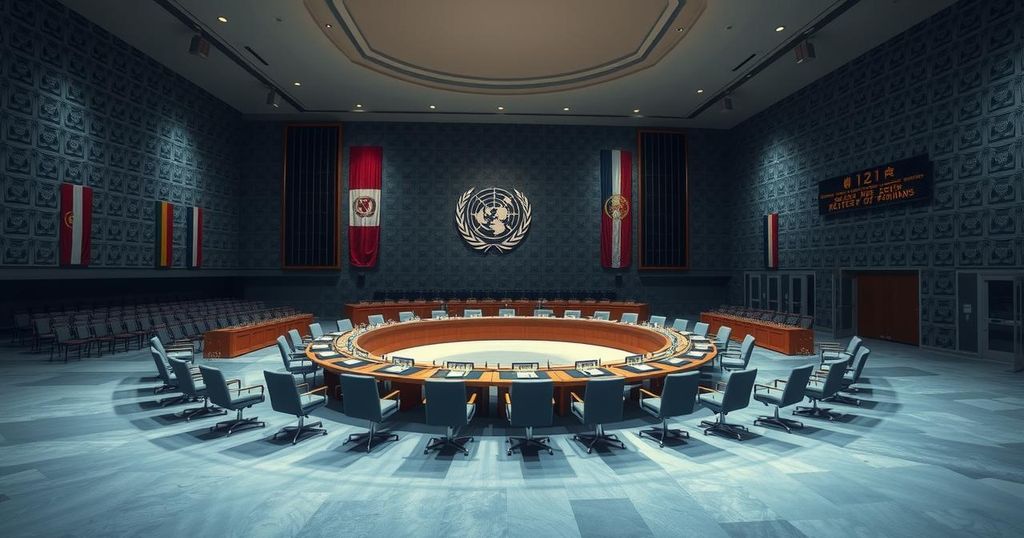World news
AFRICA, ANNA BORSHCHEVSKAYA, ASIA, BASHAR AL - ASSAD, CIVIL WAR, CONFLICT, DAMASCUS, EUROPE/ASIA, INTERAHAMWE, INTERNATIONAL RELATIONS, KR, KREMLIN, MOSCOW, NE, NORTH AMERICA, REUTERS, RUSSIA, RWANDA, SAMI, SAMIA NAKHOUL, SANCTIONS, SECURITY COUNCIL, SYRIA, SYRIAN CIVIL WAR, UN, UNITED NATIONS, UNITED STATES, WAR, WASHINGTON INSTITUTE
Amira Khan
0 Comments
Russia Critiques Syria’s New Leadership Amid Rising Sectarian Violence
In a closed UN meeting, Russia sharply criticized Syria’s new leaders, warning against rising jihadist influences and drawing comparisons to the Rwandan genocide. Russian officials expressed concerns over sectarian violence against Alawites and highlighted the risks of an Iraq-like scenario following the dismantling of Assad’s regime. Concurrently, Syria’s interim president aims for a more inclusive government, while discussions continue within the Security Council regarding the violence and the need for protective measures for all citizens.
In a recent closed United Nations briefing, Russia openly criticized Syria’s new leadership, expressing concerns about the increasing influence of jihadists and drawing parallels to the horrific genocide in Rwanda. This criticism arises despite Russia’s efforts to maintain its military presence in Syria, particularly in regions where Alawite individuals were recently targeted in violence stemming from a faction opposed to the newly established government.
Following an attack on security forces led by former loyalists of deposed leader Bashar al-Assad, a widespread wave of sectarian violence ensued. The Russian government previously supported Assad, but now emphasizes the need for Syrian unity while attempting to regain its political leverage in the region. This nuanced approach was evident in Moscow’s private discussions, which have not been publicly reported until now.
Russian envoy Vassily Nebenzia referred to the ongoing sectarian killings as resembling the 1994 Rwandan genocide. Nebenzia depicted the current situation in Syria as unchecked and alarming, asserting that violence remains a grave concern. Analysts suggest that Russia’s private critiques are strategic, aimed at balancing its support for the new government while retaining an influential role in the country’s future developments.
The briefing highlighted Russia’s concerns over the dissolution of the Syrian army and significant public workforce reductions, cautioning that a similar scenario to Iraq’s post-Saddam violence could emerge. Amid these critiques, Syria’s interim president Ahmed al-Sharaa stressed the intention to forge alliances beyond sectarian lines, aiming for a government inclusive of Alawites and free from divisions.
Moreover, the involvement of foreign fighters in recent violence has raised alarms among international envoys present at the briefing. Discussion among the UN Security Council members is ongoing, focused on delivering a unified statement to condemn violence in Syria and advocate for the protection of all citizens, regardless of their ethnic or religious backgrounds. Such statements are crucial for future engagement by the international community with Syria, depending on how inclusively the transition is managed.
Russia’s stance in a recent UN meeting highlights growing concerns over Syria’s new leadership and escalating sectarian violence, drawing uncomfortable parallels to historical genocides. While the Kremlin navigates its approach to support the new government, it remains wary of the implications of foreign fighters and the necessity for an inclusive political transition. The international community’s engagement with Syria hinges upon these developments, emphasizing the importance of stability and unity in addressing the nation’s ongoing crisis.
Original Source: www.usnews.com




Post Comment